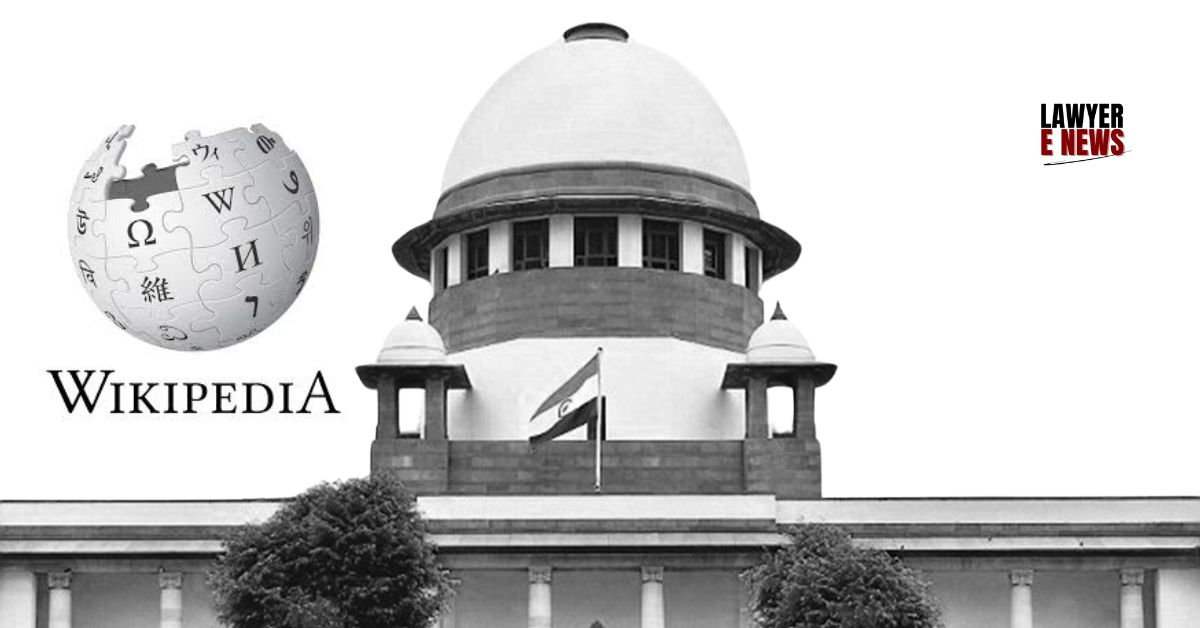-
by sayum
17 February 2026 8:32 AM



“Courts… must always remain open to public observations, debates and criticisms. In fact, courts should welcome debates and constructive criticism.” – Today, On May 9, 2025, the Supreme Court of India delivered a landmark judgment in Wikimedia Foundation Inc. v. ANI Media Pvt. Ltd., sharply rebuking the Delhi High Court’s direction that had ordered Wikipedia to delete content critical of an ongoing judicial proceeding. Emphasizing constitutional protections for free speech and open justice, the Apex Court set aside the High Court’s directive, observing that the “directions could not have issued” and were “disproportionate” and “unwarranted.”
“Every important issue needs to be vigorously debated… even if the issue is sub judice before a court”
The matter arose from a defamation suit filed by ANI Media Pvt. Ltd. against the Wikimedia Foundation and other parties over user-edited content on Wikipedia that allegedly tarnished ANI’s reputation. A Single Judge of the Delhi High Court had ordered Wikimedia to disclose the identities of certain users, which was later commented upon in an opinion article and on Wikipedia’s “talk pages,” leading the Division Bench to conclude that Wikimedia had interfered with court proceedings.
On October 16, 2024, the High Court directed Wikimedia to delete such content within 36 hours, terming it a violation of the sub judice principle and bordering on contempt of court. This order became the focal point of the appeal before the Supreme Court.
The core legal issue before the Apex Court was whether the High Court’s order directing the takedown of Wikipedia pages and discussions amounted to an unconstitutional restriction on freedom of speech and violated the principles of open justice.
The Supreme Court rejected the High Court's reasoning that Wikimedia’s hosting of user-generated content could be construed as “interference in court proceedings.” It held that: “Criticism of court proceedings or court orders done in a reasonable manner… is not contempt. In the ultimate analysis… courts should not be seen to regulate or stifle the freedom of speech and expression.”
The Court extensively referred to past precedents including Sahara India Real Estate Corp. v. SEBI, Reliance Petrochemicals v. Indian Express, and Naresh Shridhar Mirajkar, to highlight the constitutional balancing between the right to free speech and the need for fair administration of justice. The Bench also quoted the recent judgment in Imran Pratapgadhi v. State of Gujarat, reiterating: “Courts must not be seen to regulate or stifle the freedom of speech and expression… There is no other institution which can uphold the fundamental rights of the citizens.”
Notably, the Court stated that even if some criticism offered is erroneous or strong, it does not automatically amount to contempt, especially if it does not present an imminent and real threat to justice.
“People at large have a right to know… Right to know is a basic right under Article 21 of the Constitution”
The Supreme Court found that the Delhi High Court’s direction to Wikimedia was devoid of legal reasoning and did not satisfy the constitutional tests for prior restraint or contempt:
The High Court failed to assess whether there was a “real and substantial risk” of prejudice to justice, a necessity under the Sahara precedent.
The directive was disproportionate, failing the tests of necessity and proportionality.
The order ignored the constitutional protection of the right to know and the broader implications on free digital discourse and open platforms.
Citing Swapnil Tripathi v. Supreme Court of India, the Court underscored: “Sunlight is the best disinfectant… Live streaming and open justice are crucial for transparency.”
Reasserting its commitment to fundamental rights and media freedom, the Supreme Court concluded:
“It is not the duty of the court to tell the media: delete this, take that down.”
The Court quashed paragraph 5 of the Delhi High Court’s order and upheld the importance of public scrutiny, freedom of expression, and the indispensable role of media in democratic discourse.
Date of Decision: May 9, 2025
